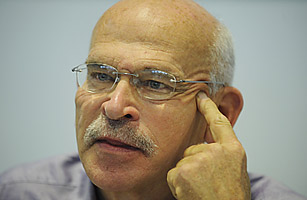
Günter Wallraff faces criticism after going undercover as a black man in Germany
When Günter Wallraff sprayed his face with dark paint and put on a black curly wig and dark contact lenses, he discovered how it felt to be black in Germany today. Sometimes he was subjected to thinly disguised or casual racism. Other times people were openly hostile to him. On one occasion, he even felt threatened.
Wallraff, who filmed his experiences as a black man as part of a new documentary, Black on White, has made a career of this sort of daring, investigative reporting. In his 40 years as a journalist, he has worked undercover at a tabloid newspaper, industrial plants and fast-food chains to expose the conditions the employees faced. In the 1980s, he posed for two years as a Turkish "guest worker" and wrote a best-selling book revealing shocking examples of discrimination and exploitation. But Wallraff's latest project may be his most controversial yet. His attempt to address racism in Germany by donning blackface makeup has drawn strong criticism from black Germans, some of whom see his movie as patronizing, if not racist itself.
"He is using white privileges. He is mimicking suppressed minorities and earning money, attention and even respect," Noah Sow, a black journalist, academic and musician, said in an interview with the news website Tagesschau.de. Tahir Della, a spokesman for the Initiative of Black People in Germany (ISD), said Wallraff's methods hark back to the minstrel shows of the 1920s in the U.S. "[Those shows] came about because blacks weren't allowed to perform in clubs and theaters, so whites dressed up to caricature them," Della told the news website TheLocal.de. "Mr. Wallraff is using the same form, playing a role he's not entitled to and preventing those who are really affected from having a voice."
There is a less controversial precedent for such a project. Fifty years ago, John Howard Griffin, a white journalist, darkened his skin with pigment-changing pills and traveled through the Deep South as a black man, chronicling his experiences in the classic American novel Black Like Me. The American author and journalist Grace Halsell embarked on a similar journey in the late 1960s and wrote the novel Soul Sister, which was also highly acclaimed. Wallraff, who came across both books after he started shooting Black on White, says he has wanted to make this kind of film for years. In the 1980s, he had prepared to go undercover as a black man in South Africa, but then Nelson Mandela was suddenly freed, apartheid came to an end and his mission lost its purpose. In the 1990s, he wanted to join African refugees who were trying to sneak their way into Europe, but he couldn't find a trafficker who would take him on.
"My journalistic influences come from America rather than Germany, where my type of journalism has little tradition," Wallraff tells TIME. Still, Wallraff's work has gained him notoriety in Germany, along with financial success. His book about the two years he spent posing as Turkish guest worker Ali Levent Sinirlioglu, The Lowest of the Low, sold more than 5 million copies and forced Germany to have a national discussion about its long-neglected Turkish minority. The dialogue led to a strengthening of the rights of temporary workers in the country and gave Germans of Turkish descent their first real foothold in politics.
But Black on White is not being met with the same level of enthusiasm. Some feel the reason may be that racism remains a touchy subject in Germany. The country's black population, which numbers between 300,000 and half a million, is mainly made up of African immigrants and the descendants of children born to black American and French soldiers and German women at the end of World War II. And even though their numbers are rising and there has been talk lately about Germany becoming a multicultural society, many minorities say they still feel like outsiders because they do not look typically German. Yet most Germans don't think their country has a problem with racism, seeing it as an issue confined to the U.S.
"What strikes you first of all about the way Germany treats black people and racism is the avoidance of the subject," says Marina Jones, a doctoral fellow in the history of African Americans and Germans at the German Historical Institute in Washington. "As an Afro-German, you are often confronted with the situation that you look 'different' and people react differently, but then [people] also treat you with something like willful color blindness. You are often deemed a foreigner, so you are alien in your own country."
Black Germans say they've been speaking out about racism in their country for years, with little progress to show for it. In 2007, the black German actress and director Mo Asumang released a film called Roots Germania about her search for her family's descendants. And the latest album and book by the popular Hamburg rapper Samy Deluxe, That's Where I'm From, released earlier this year, deals extensively with his feelings about being black in Germany. Wallraff's film is seen as a dated contribution to what is already a lively discussion. Some consider it little more than a stunt — or a "carnival," as Sow put it.
Wallraff rejects the criticism. He says a black person could not have made the same film because the transformation of his identity from a white German to a black German is an integral part of the story and resonates more powerfully with white audiences. "Germany is a developing country as far as racism is concerned," he says. "There is something close-minded and ill-at-ease about it. Germany is harboring more prejudices than it is ready to accept."
